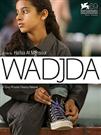|
|
||||
|
|
by Donald Levit  From Saudi Arabia, humorous and heartwarming? This is as unexpected as such qualities would be in a Germanic film, plus being in this instance written and directed by a Saudi woman to boot--obliged to monitor exterior Riyadh scenes from inside a van, communicating via walkie-talkie. On top of those surprises, documentarian Haifaa Al Mansour’s début fiction feature Wadjda is about females; even more, it is about the title ten-year-old, played by a once-in-a-great-while actual good child actress, Waad Mohammed. Overcoming subtitles from Arabic, beyond spoken words her face and body language are enough to convey and convince. A tomboyish imp who does not yet have the “little apples” that a workman calls on her to show, Wadjda nonconforms in jeans and high-top Keds clones under the black abaya, dispenses with the hijab when able to, plays decadent music cassette tapes and rolls her eyes at adult silliness. Flouting morals enforced by the religious police, she has her heart set on a green bicycle dangling colored handlebar strips and a bell. This heroine does not know how to ride a bike, forbidden to women in any case as are driving a car, painting toenails, appearing unveiled in public, working alongside or playing with the opposite sex, opposing their legally polygamous husbands’ wishes, directly touching the Koran when “impure,” and a long etcetera list. Disdaining restrictions, the entrepreneurial girl sets her mind to mastering the two-wheeler without training wheels and outracing loyal same-age friend Abdullah (Abdullrahman Al Gohani). Her adventures toward that goal are paralleled by, yet in contrast to, her schoolteacher mother’s (Reem Abdullah) subservient contortions to win the total love of the girl’s father (Sultan Al Assaf), who lives apart at his mother’s (Mariam Alghamdi) on account of her failure to bear him a male heir and is about to replace her with another, different number one wife. Wadjda comes close to being disciplined or expelled by girls school headmistress Ms. Hussa (Ahd), a stickler for conservative regimentation although students snigger that the rumored burglar in her house was in reality her lover. Wheeling and dealing during recess, selling homemade bracelets and lovers’ go-between services and sometimes charging twice, Wadjda saves up for the eight-hundred-riyal bicycle. The characters do not change much, though they may reveal new, unexpected sides, as does gossip- and appearance-conscious mom at the end. One begins to worry about Wadjda, however, for after she has charmed us and stayed silent or white lied rather than rat on classmates, she seems to give over her admirable rebellious mischievous self, toeing the line to join a select class preparing students for the Koran recitation competition offering a certificate and thousand-riyal first prize. Apart from Sony Pictures Classics theatrical release, Wadjda is shown in the (Released by Sony Pictures Classics and rated "PG" by MPAA.) |
||
|
© 2025 - ReelTalk Movie Reviews Website designed by Dot Pitch Studios, LLC |



